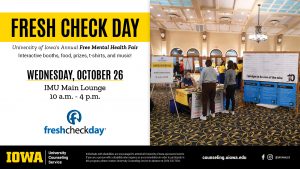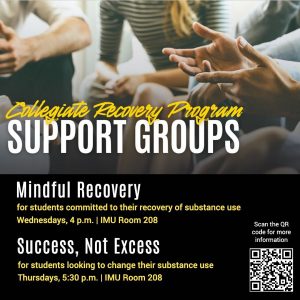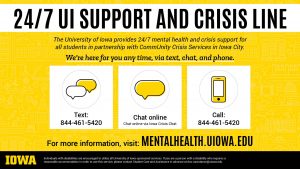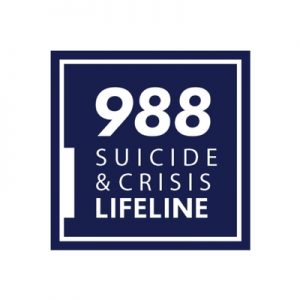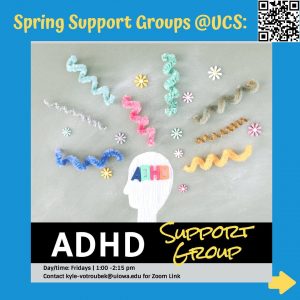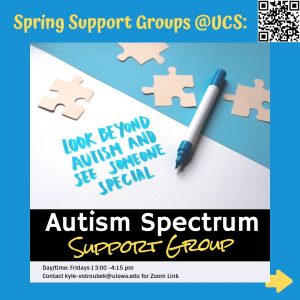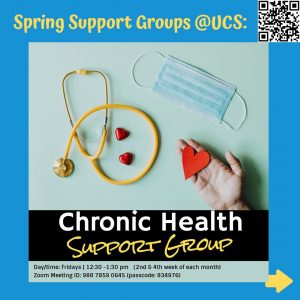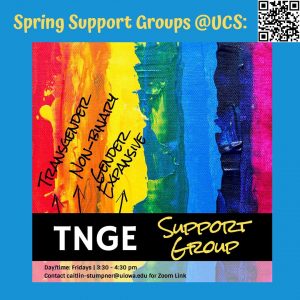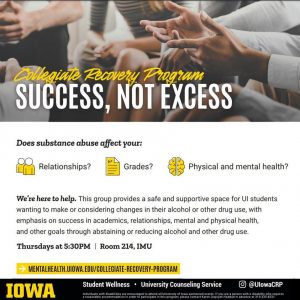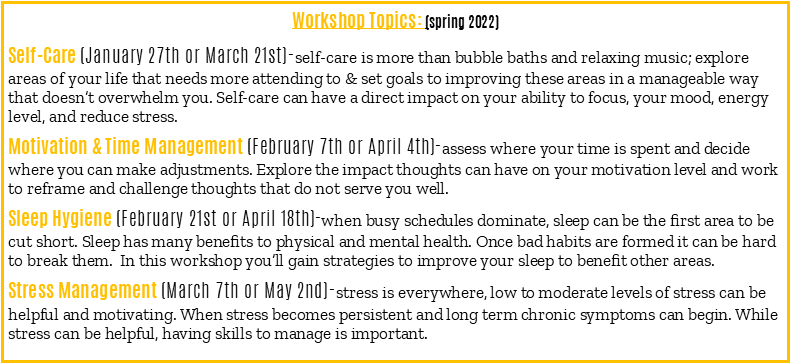Finals are over and it’s time to return home. For some, home is a place of sanctuary, for others it’s a place of stress and limitations, and for many it’s somewhere in between. Here are a few tips to help you manage this time.
Be Intentional with Your Day
While break is a time to relax, too much “doing nothing” can signal sadness, low motivation, and negative thoughts. Try to have a routine for yourself. This doesn’t have to be a strict routine and can include the things you enjoy doing or do to relax (i.e. video games, Netflix, reading, etc.). Consider doing these things outside your bed. When we spend time in our beds it can create an association with our brains that we are tired or sick, which can perpetuate a cycle of low mood or motivation.
Plan at least 2-3 things you will accomplish throughout the day (i.e. laundry, cooking a meal or baking, running errands, exercise, cleaning, craft/art projects, calling family or a friend, resume work, etc.). Having something planned and accomplished each day will give you a sense of purpose and productivity. As humans, we thrive on a sense of purpose.
Engage in daily hygiene tasks. Change out of your pajamas (even if that’s into a pair of sweats), brush your teeth, wash your face, etc. This can send positive signals to your brain.
Have a set bedtime and wake time. This can be an hour range on either end and may fluctuate based on events that are happening. Having this consistency can help keep your circadian rhythm in tune so your body knows when you should be sleeping. When our bedtimes fluctuate significantly from day to day it’s difficult for our bodies to regulate and leads to a feeling of grogginess.
Know and Set Your Boundaries
Breaks can come with different limitations/rules or uncomfortable personal questions/comments.
Plan ahead on how you will respond to questions that are sources of stress. What are you going to do when you graduate? Why don’t you have a boyfriend/girlfriend? What were grades like? Why aren’t you more involved? Whatever those pinch points are for you, think of a way you can respectfully answer the questions and ensure self-respect. When we plan ahead, we know what we will say rather than getting caught off guard and oversharing personal information. Some examples might be: I’m exploring my options, I have time to figure it out, I appreciate you caring to ask, and I’d like to keep that information to myself. Set personal boundaries for how you will respond not for how you expect the other person to respond.
Practice Perspective Taking
Recognize that this break can be a challenge for others within in your household. Whether that includes sharing a bathroom with a sibling who has had it to themselves, a parent who has not had to worry about when you’ll be home, parental excitement to spend time with you or have you help out around the house, new relationships that have formed, changes in routine, uncertainty… the list goes on. Take a step back and see the situation as an outsider looking at the facts vs. your perception.
Focus on What’s in Your Control
This is a time of change that may seem odd given how many years you spent living with these people. We cannot control others, but can control our thoughts, attitude, behaviors, routine, and how we care for ourselves. When we are experiencing something out of control it can be good to practice radical acceptance thinking – acknowledging our emotions and applying acceptance. Acceptance doesn’t mean we like or condone the behavior or circumstances. It might look like this, “I’m annoyed and sad Mom’s new boyfriend is here all the time and I accept this is Mom’s house and relationship to decide.” Acceptance doesn’t mean you like it or condone it, but rather helps us to move forward and not get caught up in unhelpful thinking patterns.
Have Self-Compassion
Lastly, but not least, be kind to yourself. This can be a difficult time for many reasons. Check in with yourself on how you are feeling and practice staying in the present moment. Recognize this difficult time and have internal self-talk like you would with a friend, family member, or someone very close to you.
 Take a minute and think on this, have you been in the middle of working on an assignment or studying for a test when suddenly you catch yourself scrolling on your phone with no intention…yep, likely you’ve been there. Social media is designed to be bottomless content which leads to mindless scrolling. While social media has it’s benefits such as connection & sense of belonging; it can have negative impacts on one’s mental health as they compare themselves to others and experience an increase in sadness and isolation.
Take a minute and think on this, have you been in the middle of working on an assignment or studying for a test when suddenly you catch yourself scrolling on your phone with no intention…yep, likely you’ve been there. Social media is designed to be bottomless content which leads to mindless scrolling. While social media has it’s benefits such as connection & sense of belonging; it can have negative impacts on one’s mental health as they compare themselves to others and experience an increase in sadness and isolation.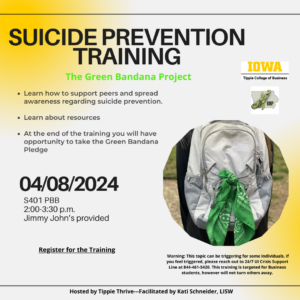
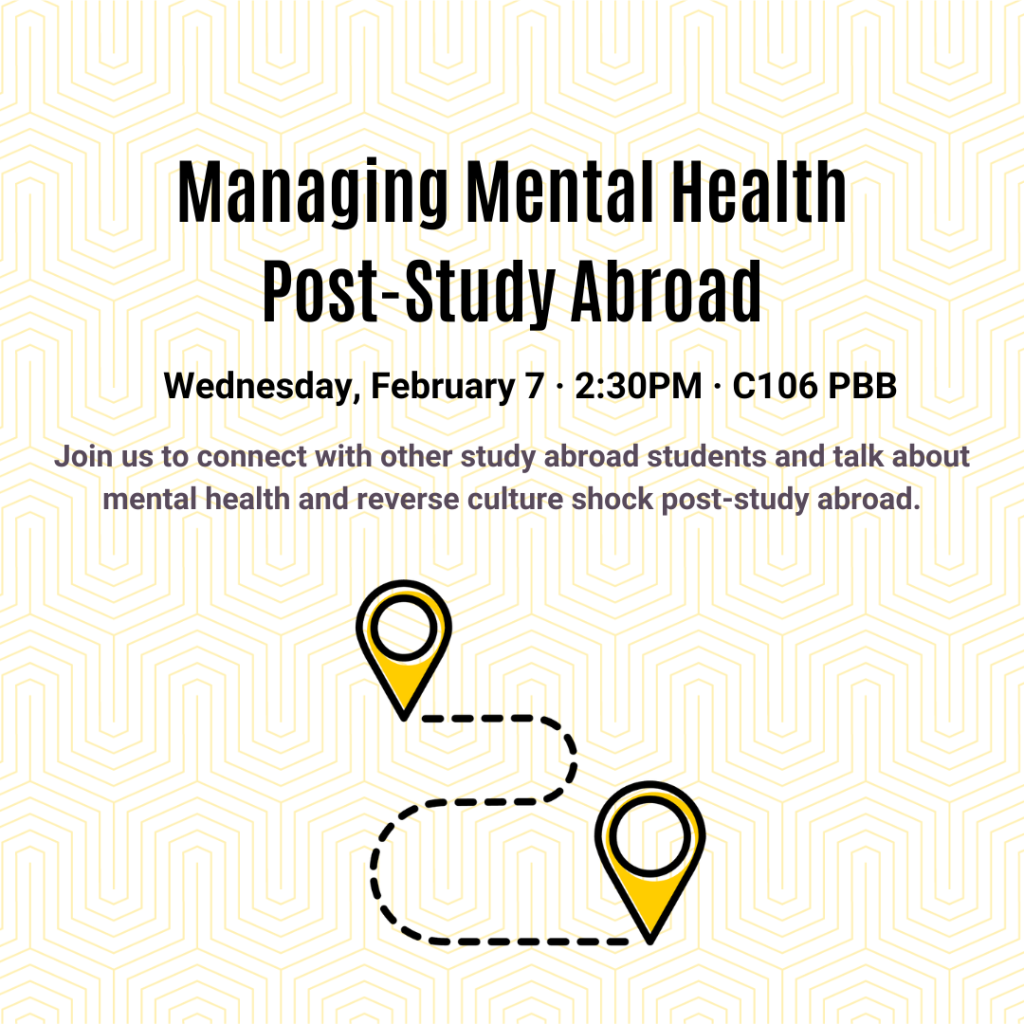



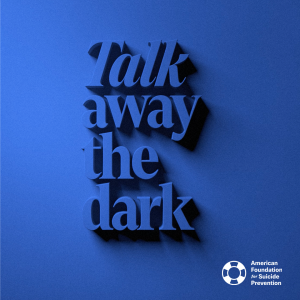 This week is Suicide Prevention Week, did you know that talking is the first step to preventing suicide? This isn’t just for the person who is experiencing suicidal ideation, but a way for a peer to engage in conversation with a peer. Eight in 10 adults are eager to learn how to help someone who may be suicidal. At Tippie we want to be able to equip you with strategies and skills on how you can support a peer who is experiencing suicidality.
This week is Suicide Prevention Week, did you know that talking is the first step to preventing suicide? This isn’t just for the person who is experiencing suicidal ideation, but a way for a peer to engage in conversation with a peer. Eight in 10 adults are eager to learn how to help someone who may be suicidal. At Tippie we want to be able to equip you with strategies and skills on how you can support a peer who is experiencing suicidality.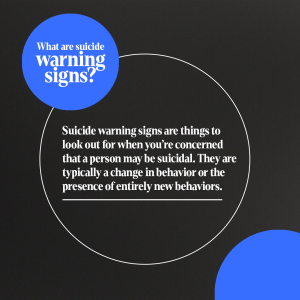
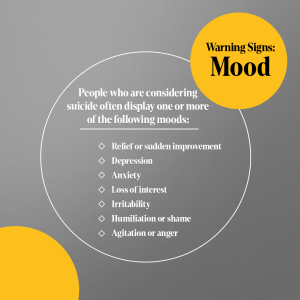
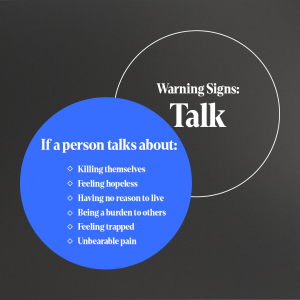
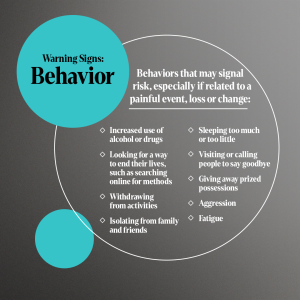
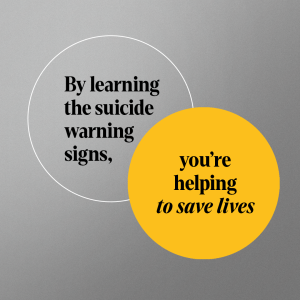
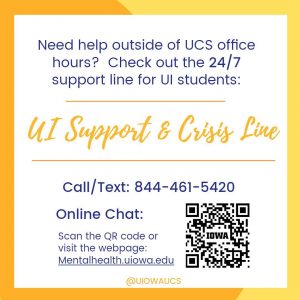 University of Iowa in partnership with CommUnity Crisis Services provide around-the-clock mental health crisis and support assistance via phone, chat, and text for all UI students. The UI Support and Crisis Line will provide critical support for students living on and off campus, and can be reached via phone or text at 844-461-5420 or chat at mentalhealth.uiowa.edu.
University of Iowa in partnership with CommUnity Crisis Services provide around-the-clock mental health crisis and support assistance via phone, chat, and text for all UI students. The UI Support and Crisis Line will provide critical support for students living on and off campus, and can be reached via phone or text at 844-461-5420 or chat at mentalhealth.uiowa.edu. Throughout the week you may notice Tippie Thrive Advisory Board members handing out candy and hearts with compliments/affirmations. While these treats are meant to bring a smile to your face, improve your mood and help feel connected to others; there’s more to these. These treats are meant to remind you to practice self-compassion.
Throughout the week you may notice Tippie Thrive Advisory Board members handing out candy and hearts with compliments/affirmations. While these treats are meant to bring a smile to your face, improve your mood and help feel connected to others; there’s more to these. These treats are meant to remind you to practice self-compassion. College can present many challenges and stressors from managing time, navigating relationships, experiencing pressures of deadlines, tests, & assignments, discovering your identity, preparing for your future, comparing yourself to peers, processing past experiences, and the list goes on and on. As a business student you have access to Kati Schneider, LISW, the UCS Embedded Mental Health Therapist. Kati provides brief individual therapy, connects students with on and off campus resources, provides consultation to faculty and staff, and offers workshops and programming specific to mental health wellness and interventions.
College can present many challenges and stressors from managing time, navigating relationships, experiencing pressures of deadlines, tests, & assignments, discovering your identity, preparing for your future, comparing yourself to peers, processing past experiences, and the list goes on and on. As a business student you have access to Kati Schneider, LISW, the UCS Embedded Mental Health Therapist. Kati provides brief individual therapy, connects students with on and off campus resources, provides consultation to faculty and staff, and offers workshops and programming specific to mental health wellness and interventions.